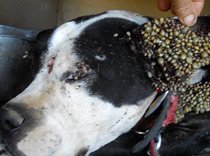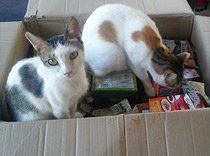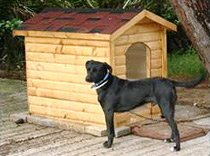Advice for tourists in dealing with strays
It is important to read the following information if you are an animal lover planning to visit Greece.
Firstly, you must expect to see many stray cats and dogs, some of which are in poor condition, sick, injured or emaciated. You will probably also encounter litters of puppies and kittens which have been abandoned. This is not unusual and it can be particularly upsetting if your homeland has good animal welfare conditions with very few stray animals.
Greek law states that Municipalities are responsible for the health of the stray animals living within their boundaries. If a dog or cat is injured by a car, etc., the Municipality is responsible for treating it, microchipping, giving annual vaccinations and neutering it. However, in reality, it isn’t as simple as this.
There are groups of wonderful Greek people who work really hard to help these animals but, of course, their resources are always stretched and they just don’t have room to take every needy animal into their care. They also take into account that they may have to keep the animals for many years so the commitment is long term.
The following advice was written by a Greek vet who works very hard to help as many strays as she can in her area but the problem is huge. We support as many groups as possible to fund neutering programmes but this is never enough, and it isn’t easy to catch the cats and dogs in the first place.
General advice
- Don’t take a stray to your hotel
- Don’t let a stray follow you around and don’t let it get attached to you as, once you leave, it will be alone
- Don’t feed a stray if it looks okay as not all are abandoned and may be fed by someone already
- If you do feed a stray, do it some distance from hotels as many hotel owners don’t like having strays hanging around or too close to their guests
- Give appropriate food, not bread or cow milk which they don’t digest well
Injured Animals
- If you can do so safely, you may offer food and water but avoid handling the animal unless necessary as it may be in pain and could bite
- Contact a local vet and ask what can be done (check Google Maps to locate one). You can also investigate via tourist information or the internet to locate an animal welfare group and ask if they can help. However, you should encourage such groups by making a donation for their help as they may well be reluctant to add to the number of animals in their care.
Witnessing animal abuse/cruelty
- Unfortunately, this is fairly common in Greece but try to communicate safely with the person responsible and take photos and details of location and a description
- Report the incident to the nearest police station and file a formal complaint and you will be required to give your personal details
- Remind the police of the government directive that instructs them to investigate your complaint and answer in writing detailing the action taken (both Greek in English or the language of your country)
If you want to adopt the animal
- This is not a simple process and, if you have thought very thoroughly about the responsibility you are wishing to undertake, then don’t leave your decision until the last minute as the preparations can take weeks to achieve
- We can offer advice as we have a colleague who understands the process
Complaints or concerns
You can also complete and send the complaints form below to the contact address on the form.
Please also send a copy to the Panhellenic Animal Welfare Federation by emailing [email protected]
Together we can try to make a difference and get our voices heard.




